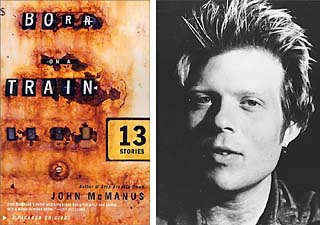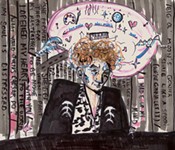Rise and Shine
The quiet and uncalculated approach of John McManus
By Shawn Badgley, Fri., April 25, 2003

We are wondering what he will become. We have his second book of short stories, Born on a Train, open to the very first page, which is one of two pages loaded with praise from papers across the country for his first book of short stories, Stop Breakin Down. This is what happens when you are an overwhelmingly fine writer, even when your advance is four digits instead of $400,000, and even if you're not One to Watch both one year before and one year after your first book hits the shelves. People respond positively and with great force. But we are wondering about one response in particular, one from the Richmond Times-Dispatch, and it goes a little something like this: "John McManus's short stories are the literary equivalent of drive-by shootings. ... McManus is either going to become the next Céline or self-destruct before he turns thirty."
The 25-year-old looks up. He has an ear infection, and he can't hear himself, and because he's not exactly the boisterous-writer-in-a-restaurant type, his already soft speech is getting softer under the speaker over our table at Polvo's. He smiles and takes a sip of his margarita. His eyes are blue and a little bit cloudy.
"I'm not sure I want to become either of those," he deadpans. "I don't even like Céline."
It's hard to say what Céline would think of McManus. Céline's name was not included among the two pages of laudatory blurbs, because Céline died in 1961, and Stop Breakin Down was released by Picador in 2000. Would he respond to the young Tennessean's ability to inhabit stories like "Eastbound," from Born on a Train, which shows two elderly, life-beaten sisters stuck in a bum car on the highway and the hallucinations that leak from that crisis? The self-reflex of his work, found in the homoerotic tension of "Fetch," and yet also the simultaneous embrace of the unfamiliar, as in the dialectical experimentation of "Thatcher Mountain"? "After finishing one story," the Whiting Writer's Award winner says, "I will always try to follow it up with something totally different." What about the playwright's ear for dialogue (he is, after all, a friend of the Rude Mechanicals' Kirk Lynn)? The humor in his methodical examination of modern everyday disillusionment? (Sorry about that one.) Would the World War I veteran and notorious anti-Semite ignore McManus because McManus is gay? Who knows? Who cares?
Perhaps McManus' father, Barry, does. His father was an English major and newspaperman who now owns Benchmark Taxi company. He writes long and "elegant" letters, but despite the occasional urge, never a novel. "When I would ask why not, he said he never had a story to tell," his son says sadly. His father thought that McManus was "wasting time reading science-fiction" -- Gene Wolf, Frank Herbert, Isaac Asimov, Ursula K. Le Guin -- as a youngster "instead of the classics he wanted me to read, Charles Dickens or Dostoevsky, when I was 8 years old. And I read those books, but never got any enjoyment out of them at the time. I think he had me reading Crime and Punishment in the third grade."
A decade later, McManus at 17 would find himself moving from Maryville, Tenn., a city of 20,000 just 20 miles south of Knoxville, to Baltimore and Goucher College, where he would veer briefly into premed ("I hated it") before settling into English and creative writing with teachers like Madison Smartt Bell (All Souls' Rising). After that, he attended Hollins University in Roanoke, Va., where he studied under Pinckney Benedict (The Wrecking Yard and Other Stories) in a one-year M.A. program.
"I just like to be in a campus environment, where you can find support as you're writing, but also the workshop experience, which for me has been as important as anything," he says today as a fiction fellow at Michener, a status that at this point, with two books under his belt and a novel in the can (Waystation, set in Baltimore and ready for release next year), not to mention two degrees already, can only be considered icing. And after traveling for school and then to places like Nicaragua ("I absolutely hated it"), he says he's here in Austin for a while.
"It's the perfect environment for a writer. There's always something going on. I feel like I'm very productive here." I look at his notebook, a thick, ledgerlike thing with a Bloodshot Records sticker on the cover and pages filled with looping, sloping jags of small black script. It reflects McManus' authorial voice: dense but of wide breadth; pretty but gritty. Rough and tumbling up into something urgent.
The thing about McManus, though, is that he has yet to shoot out as a blessed member of the overhyped, overpaid young celebrity writers club, a club that grows in number every month. But that topic is tired; better, instead, to note that McManus -- and his publisher, Picador -- have done things the the patient way. You can call it old-fashioned or you can call it old-school, but the fact is that McManus' career is building momentum instead of having it bought for him by his publicists. There have been no glossy spreads, no superduper store displays, just the spirit of his Southern-powered work (Denis Johnson, Cormac McCarthy, and Breece D'J Pancake come to mind) -- acting natural. Speaking for itself. And people are beginning to hear it, like you sometimes hear a low, distant howl getting closer. ![]()








